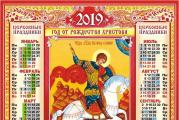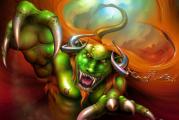Indian fairy tale wise men and elephant. The parable of the elephant and the four wise men. Gregory Coakle. Elephant Trouble
There were once six blind people in a village. Somehow they heard: “Hey, an elephant came to us!” The blind had no idea what an elephant was or what it might look like. They decided, "Since we can't see it, we'll go and at least touch it."
"An elephant is a column," said the first blind man who touched the elephant's leg. “An elephant is a rope,” said the second one, who grabbed him by the tail. "No! It is a thick bough of a tree,” said a third, whose hand passed over the trunk. “He looks like a big fan,” said the fourth blind man, who took the animal by the ear. “The elephant is a big barrel,” said the fifth blind man, feeling his stomach.
“It looks more like a smoking pipe,” concluded the blind man, running it over the tusk.
They began to argue heatedly and each insisted on his own. It is not known how it would have ended if a wise man passing by had not become interested in the cause of their heated argument. To the question: "What's the matter?" the blind replied, "We can't figure out what an elephant looks like." And each of them said what he thought about the elephant.
Then the wise man calmly explained to them: “You are all right. The reason why you judge differently is because each of you touched different parts of the elephant. In fact, the elephant has everything that you are talking about. Everyone immediately felt joy, because everyone was right.
Morality lies in the fact that in judgments different people about the same thing, most often only a fraction of the truth. Sometimes we can see part of the truth of the other, and sometimes not, because we look at the subject from different angles of view, which rarely coincide.
Therefore, we should not argue until we are blue in the face, it is more reasonable to say: “Yes, I understand, you may have certain reasons to think so.”
Remember the parable of the four blind wise men and the elephant?
Let me remind you with your permission (in my creative pre- and pre-work ...) ...:
Somehow four blind wise men gathered to decide what is an elephant?
One approached the trunk, felt the elephant's trunk and said: "Undoubtedly, the elephant is something long and wriggling like a snake, it has the habit of breathing and releasing jets of water..."
The second approached him to make sure what he had heard, but the elephant had already turned sideways to them,
and the second wise man felt his huge leg ... "No," says the second elephant sage- this is such a thick, rough log that you can’t wrap it around ... "
The third decided to judge them and also approached them.
And the fidget elephant turned again ... now with its tail towards them ...
The third wise man grabbed the elephant by the tail and scolded his friends that they were playing him ... or wrong.
"An elephant is a rope, getting thicker and thicker towards the top, it is not excluded that this rope is up to the sky, no matter how much I reached out with my hand - it's all a rope and a rope ..." - said the third wise man.
The fourth wise man became very interested in which of them was right, and since he was the most experienced and wise among them, he decided to judge everyone and approached his comrades in the search for truth.
The elephant was obviously tired of all this and was frightened by the third wise man when he began to poke at the base of the tail with a stick ...
Well, what do you think? what happened?
Yes, this is exactly what happened - THE ELEPHANT HAS OPENED ELEMENTARY DIARRHEA!
And all this "Inner Wealth" poured out on the fourth sage.... ....
The fourth wise man did not doubt for a second what an elephant was ...
He explained to his inexperienced friends that an elephant is some kind of liquid and foul-smelling substance in in large numbers per square meter...
And what do you think?
All the remote wise men... agreed with him, since he was an authority and they believed him...
And the elephant was so tired of all this that the elephant took and trampled all the wise men ...
And only, dying under the heavy and huge legs of an elephant, they called in unison that they were all wrong ...
They all shouted as one that the elephant is ... death ...
What is the saddest thing is that this time they... also made a mistake...
Reviews
Elephant and five blind men
Fable of Vladimir Shebzukhov
With a rope five blind -
From one to all to five -
They walked mumbling something
Touching the near shoulder ...
The sighted man called out to those walking:
“The elephant will crush you, not otherwise!
He stood in front of you on the way ...
The giant is worth getting around!”
One blind man felt his trunk,
Which suddenly made him laugh.
“It’s difficult to crush us with a rope,
What was called a giant is false!
Feeling the tail with a deft hand,
Another called the elephant a rope.
Touching his stomach, the third: “That's right,
The elephant is an enormous cistern!”
The fourth said, stroking his legs,
What an elephant - columns on the road.
And the ears are called good,
Kohl turned out to be an elephant carpet!
Sometimes this is the trouble of a scientist -
The color is black, different from white,
And white, different from black,
He does not see the whole in black and white!
The daily audience of the Proza.ru portal is about 100 thousand visitors, who in total view more than half a million pages according to the traffic counter, which is located to the right of this text. Each column contains two numbers: the number of views and the number of visitors.
The Parable of the Blind and the ElephantBlind and elephant. Parable
Elephant and the blind
The Parable of the Blind and the Elephant
There were once six blind people in a village. Somehow they heard: “Hey, an elephant came to us!” The blind had no idea what an elephant was or what it might look like. They decided, "Since we can't see it, we'll go and at least touch it."
"An elephant is a column," said the first blind man who touched the elephant's leg. “An elephant is a rope,” said the second one, who grabbed him by the tail. "No! It is a thick bough of a tree,” said a third, whose hand passed over the trunk. “He looks like a big fan,” said the fourth blind man, who took the animal by the ear. “The elephant is a big barrel,” said the fifth blind man, feeling his stomach.
“It looks more like a smoking pipe,” concluded the blind man, running it over the tusk.
They began to argue heatedly and each insisted on his own. It is not known how it would have ended if a wise man passing by had not become interested in the cause of their heated argument. To the question: "What's the matter?" the blind replied, "We can't figure out what an elephant looks like." And each of them said what he thought about the elephant.
Then the wise man calmly explained to them: “You are all right. The reason why you judge differently is because each of you touched different parts of the elephant. In fact, the elephant has everything that you are talking about. Everyone immediately felt joy, because everyone was right.
The moral is that in the judgments of different people about the same thing, most often there is only a grain of truth. Sometimes we can see part of the truth of the other, and sometimes not, because we look at the subject from different angles of view, which rarely coincide.
Therefore, we should not argue until we are blue in the face, it is more reasonable to say: “Yes, I understand, you may have certain reasons to think so.”
Sometime for fun
Servants led to the Raja
To the palace of the three blind
From the birth of people...
Well, to laugh
The master succeeded in full
Brought with three blind men
To the palace of the raja of the elephant ...
People crowded around the palace
Everyone was waiting impatiently
That now something will be here:
The Raja has thought of something!..
The servants were taken to the square,
Where an elephant waited, three blind men
And told them to touch
Solve their riddle.
First, touching the trunk
And I can't control myself
Turned pale and, recoiling,
He cried out in horror: “Boa constrictor!
Why, such a bastard
Spit once - kill me! -
And that blind man's reward
There was merry laughter from the crowd.
And the second, declaring with his hands
The strong leg of an elephant,
He said that the elephant is like a stone,
That he is a living rock.
The screams got louder
Laughter became louder
After all, the people have long been very
I didn't see such fun.
The third timidly touched his ear
This "stone snake".
Finally, gathering my courage,
He expressed his thoughts:
"Though to imagine the beast
I could hardly do it
Still, I think it's probably
The elephant is a huge ... moth!
I am his big wing
At this moment I hold it in my hands! -
Laughter exploded over the crowd
Laughter choked the raja...
His fun was a success! ..
At that moment alone
It just wasn't funny.
Shocked elephant...
"Yes, I am strong as a stone,
Yes, I'm strong as a boa constrictor
But the soul under the clouds
I flutter like a moth!”
And, "seen" by the blind,
Grateful for their words
Put the blind on their backs
And took them home...
At that moment the elephant realized
And I saw well:
Blind is not he who is blind with his eyes,
A sighted one who sees with his soul...
We are sometimes blind
And we scare ourselves in vain ...
And in the elephant we are so ridiculous
All we see is an elephant!
There is a parable about three blind men examining an elephant.
One, touching the elephant, says: "Oh, it looks like a wall."
Another touched the elephant's leg and said, "It's a tree."
The third grabs the elephant by the tail and says: “Well, what are you, this is a rope!”
This parable also has an unexpected continuation.
Three blind elephants decided to find out what kind of person is.
The first felt and said that he was flat and wet.
The other two felt and agreed ....
And the meaning in it is this - the world cannot be intellect
Though hundreds of blind or sighted comprehend!
The one who created everything knows the vector
Which will help you not to go astray.
You have it different and with all the meaning and style,
You are headed by humanity, soul ...
But no matter how much the soul invested efforts,
The blind will not be able to "see" the frogs.
Behind the mountains was located Big city. All its inhabitants were blind. One day, a foreign king with his army encamped near a city in the desert. The royal army had a huge war elephant, which glorified itself in many battles. With his very appearance, he plunged his enemies into awe. All the inhabitants of the city were eager to know what it was - an elephant, and several blind people of this community ran like crazy to find out.
Having no idea about what elephants are, they began to feel it from all sides. Each of them, feeling some part of him, decided that now he knows something. When they returned, they were surrounded by a crowd of impatient townspeople. Deeply deluded, the blind longed to learn the truth from those who themselves were in error. People asked about the shape and size of the elephant and listened to their explanations.
The man touching the elephant's ear said, "An elephant is something big, wide and rough, like a carpet."
But the one who felt the trunk said: “I have authentic information about it. It looks like a straight hollow pipe, terrible and destructive”
“The elephant is powerful and strong, like a column,” objected another, who felt the leg and foot of the elephant.
laughing elephant
The most fun is the elephant himself;)
This parable allegorically explains why people can have radically opposite opinions (at first glance) on the same topic.
Most of us are blind. We see reality through the prism of our own beliefs, our own personality, our own system right or wrong, through the prism own experience etc. This makes us practically blind, since in most cases our knowledge of things is partial, superficial and subjective, and the greater the degree of abstraction of something about which we make our judgment, the more blind we are.
That is why there are radically opposite opinions regarding such abstract concepts as love, God, friendship, freedom, and so on. The main joke is that everyone is right. And the one who claims one thing and the one who claims something completely different. Everyone just touched different part elephant and mixed it with his subjective opinion about such an experience.
There are many versions of this parable, the author of which is unknown to me. It is often told at trainings and used in coaching practice. This story helps to look beyond their beliefs and "crawl" out of the hole in which people often drive themselves. I translated it today from the English version that I like best...
chained elephant
When I was a boy, I was very fond of the circus, and of all the animals, I was most fascinated by the elephant. Later I found out that this is the favorite animal of all children. During the performance, it demonstrated its huge mass, size and strength... But after the show, until its return to the stage, the elephant was tied to a small peg. The chain held his legs. However, the peg was tiny and barely driven into the ground. Although the chain was large and strong, it seemed obvious to me that an animal capable of uprooting trees from the ground could easily break free and get away. For me it was incomprehensible. What kept him? Why didn't he run away?
When I was 5 or 6 years old, I still believed in the wisdom of adults. I asked these questions to my teacher, father and uncle. One of them explained to me that the elephant had been tamed. And I asked the obvious question: "If he is tamed, why is he kept chained?" I don't remember getting an answer that satisfied me. Then I forgot about the riddle of the chained elephant and remembered it only when one company suddenly started talking about the same topic.
A few years ago I discovered that someone was wise enough to find the answer. The elephant in the circus did not run away, because he was used to this peg from a very young age.
I closed my eyes and imagined a helpless baby elephant tied to a peg. I'm sure he was pushing and pulling the chain with all his might, trying to free himself. But, despite his best efforts, he did not succeed, because the peg was too strong. I imagined him falling asleep when all his strength had already been exhausted, and the next day trying to break out again, and the next day after that ...
Until one day, a terrible day for his entire subsequent life, the animal took his weakness for granted and resigned himself to fate. This huge and powerful elephant that we see in the circus does not run away because the poor animal thinks it cannot run away. The memory of the weakness he felt shortly after his birth remained forever in his mind. And worst of all, he never questioned those memories. He never tried to test his strength again...
And so it happens. We are all more or less like that circus elephant. We travel the world chained to hundreds of pegs that take away our freedom. We live, continuing to believe that we are not capable of more just because once, a very long time ago, when we were small, we tried to do something and we did not succeed. Then the same thing happened to us as with the elephant. The memory will forever have a memory: "I can't, I can't, and I never will."
We live within the boundaries of the memory of the person we once were and who no longer exists. That person never made it.
The only way to know if it will work this time is to try to do something again with all the strength of the soul... all the strength of our soul.
Dedicated to all those who are still chained to small or large pegs, unaware of their great strength, and afraid to take a step forward...
The text of the parable in English:
The Chained Elephant
When I was a young boy I really loved the circus, and most of all the animals I was fascinated by the Elephant, which I later I found out, is the favorite animal of all kids. During the show the big animal was demonstrating its huge weight, its size and strength… but, after the show and before he had to return back to the stage, the elephant was standing tied up to a small pole in the ground. A chain was keeping its feet imprisoned. Nevertheless, the pole was really tiny and hardly dug into the ground. Although the chain was big and strong, it seemed obvious to me that an animal with the strength to uproot trees could easily break free and walk away. I thought of it as a mystery. What was keeping him? Why wouldn't he run away?
When I was 5 or 6 years old I still believed in grownup wisdom. I asked my teacher, my father and my uncle, of the mystery of the Elephant. Someone explained to me that the elephant had been tamed. So I made the obvious question: “If he has been tamed, why do they have to keep him chained?” I don't remember getting a satisfactory answer. In time I forgot the mystery of the chained Elephant to the pole and remembered it only when in the company of people who had once held the same question on the subject.
Few years ago I discovered that someone was wise enough to find the answer. The Elephant of the circus is not running away, because he is used to that very same pole from a very young age.
I closed my eyes and I imagined the newly born defenseless Elephant tied to the pole. I am sure that back then the little Elephant pushed and pulled and sweated trying to get free. But, in spite of all his efforts, he didn't succeed because the pole was too strong for him. I imagined him sleeping exhausted and next day trying again, and the day after the same…
…Until one day, an awful day in his history, the animal admitted to his weakness and submitted to his destiny. This enormous and powerful elephant we can see in the circus is not running away because the poor animal thinks he can’t. The memory of the weakness he felt shortly after his birth is forever engraved in his mind. And the worst is that he never seriously questioned this memory. He never tried to test his strength…
This is how it is. We are all more or less like the Elephant of the circus. We travel around the world chained to hundreds of poles that take away our freedom. We live believing “We can’t” do so many things just because once, a long time ago, when we were young, we tried and we didn’t succeed. Then the same thing happened to us as to the Elephant. The same message “was engraved in our memory”: I can’t I can’t, and I never will.
We live inside the boundaries of a memory of the person we were once and who doesn't exist anymore. That person didn't make it.
The only way to find out if we can, is by trying again with all the power of our soul…all the power of our soul.
Dedicated to all those still chained to small or big poles, not being conscious of their enormous strength, afraid of taking a step forward…
And after that, a few questions that you can ask for reflection:
How are you or someone else like an elephant or a baby elephant?
What can be called the "chain" that you are attached to?
What happens if you get free?
Are there any situations in which you gave up and refused to fight?
What do you think about your own abilities? Which of these beliefs should be changed?
We continue our cycle Sufi parables. And today we will tell the story of subjective assessment each of us.
This story is given in the arrangement of Rumi - "The Elephant in the Dark Room" - and is taken from his book "Mesnevi". Hakim Sanai recounts the same tale in an earlier version in the first book of his Sufi classic, The Walled Garden of Truth. He died in 1141. In both authors, the story appeals to the same argument, in accordance with the tradition used by Sufi teaching masters for many centuries.
Blind and elephant
Beyond the mountains was a large city, all the inhabitants of which were blind. Once a foreign king with his army encamped in the desert near the city. He had a huge war elephant in his army, famous in many battles. With his very appearance, he already plunged his enemies into awe.
All the inhabitants of the city were eager to find out: what is it - an elephant. And here are some representatives of the society of the blind, in order to solve this problem, hastened to the royal camp. Not having the slightest idea of what kind of elephants are, they began to feel the elephant from all sides. At the same time, everyone, having felt any one part, decided that now he knows everything about this creature. When they returned, they were surrounded by a crowd of impatient townspeople.
Deeply ignorant, the blind longed to know the truth from those who were in error. Blind experts vied with each other about the shape of the elephant, and listened to their explanations. The one who touched the elephant's ear said: "An elephant is something big, wide and rough, like a carpet." The one who felt the trunk said: “I have authentic information about it. It looks like a straight hollow pipe, terrible and destructive.” “The elephant is powerful and strong, like a column,” objected a third, feeling his leg and foot.
Each felt only one of the many parts of the elephant. And everyone misunderstood it. They could not grasp the whole with their minds: after all, knowledge is not the companion of the blind. They all imagined something about the elephant, and they were all equally far from the truth. What is created by speculation does not know about the Divine. In this discipline, paths cannot be blazed by ordinary intellect.




